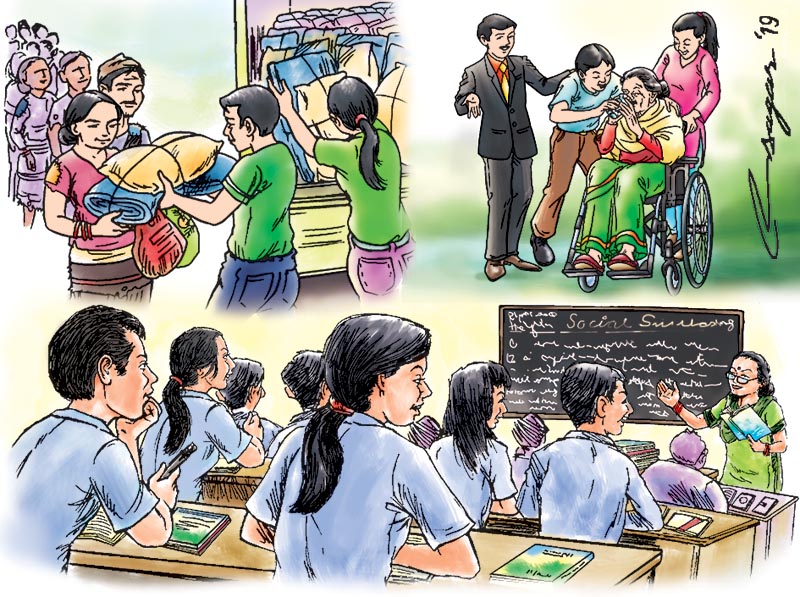Social work: A rewarding career
Social work is an imported as well as a developing profession. To make this profession reliable, a practitioner should focus on indigenous principles, morality and methods that are appropriate in the local context
World Social Work Day, on March 20, celebrates the contribution and impact that social workers make in society. The 2019 World Social Work Day highlights ‘Promoting the Importance of Human Relationships’. A utilitarian action targeted at enhancing the wellbeing of the community, social work is often overlooked as a discipline rather than a career, since the priorities for labour force development in a developing nation are different from those of a developed nation.
Social work today is truly an international profession. It is a practice-based profession and an academic discipline that promotes social change and development, social cohesion, and the empowerment and liberation of people. Principles of social justice, human rights, collective responsibility and respect for diversities are central to social work. A lot of people, however, don’t give a second thought to the social workers until they need their support.
Outlining social work is not easy. There are many forms of social work, which are difficult to encapsulate in a single definition. Instead, social work is a vast discipline that encompasses many modalities. Social work includes everything from humanitarian response missions to helping families gain access to government services, to counselling. But, one common feature in this broad concept is the tendency to seek for the betterment of the people at the individual or societal level without any return.
Social work in Nepal is not a new discovery. It can be traced back through many forms of voluntary work by religious and cultural institutions, such as the guthi (clan-based association), dharmashala (free residences for the poor) and pati pauwa (public resting place).
But formal social education began in 1996, with the first bachelor’s degree in social work at Kathmandu University. This was the only Bachelor of Arts in Social Work available in the entire country until 2005 when Purbanchal University began a Bachelor of Social Work programme at Kadambari Memorial College and a Master in Social Work at St Xavier’s College.
A lack of champions who can go an extra mile to build the profession is a problem when we look at the need to build an indigenous and globally applicable Nepalese model of social work. As a profession, social work has been introduced from western countries. Western ideology and philosophy regarding social work take precedence over the developing countries’ philosophy and viewpoint. Apparently there are differences between Nepali society and western society. If the society and cultures are different and circumstances are dissimilar, it is sure that the principles, model and practice pattern should be different.
Social work should focus on indigenous circumstances. If you teach a child “A” for “airplane” it is difficult to comprehend for those children who never got a chance to see an airplane; but if you teach “A” for “ant”, it is easy to comprehend because we are familiar with ants. Social work trainees face the same kind of trouble in field work. Nepali social work trainees who go through western theories, methods and principles find it challenging to apply them in the Nepali context.
Social work is thus imported as well as a developing profession. To make this profession reliable, a practitioner should focus on indigenous principles, morality and methods that are appropriate in the local context.
The biggest problem for social work education and its growth and quality in Nepal is the absence of a clear policy with the University Grants Commission, an umbrella body responsible for the promotion and maintenance of standards of higher education. The lack of formal recognition of professional social workers by the government is also a major issue. Graduate social workers cannot compete for many government jobs as the training is not yet recognised by the Public Service Commission.
Nepal is going through a period of transition, and social work can play a crucial role in rebuilding lives and communities that have been affected due to the series of conflicts and natural calamities. Professional social work education is essential for the development of the profession. The underutilisation of social work talent due to its low recognition in the country is having an impact on the overall development of the profession.
Social Workers Association Nepal, which was established five years back, has to be made stronger and should negotiate with the government to recognise the profession, protect the rights of social workers and ensure accountability. International organisations like the International
Association of Schools of Social Work and regional bodies like the Asian and Pacific Association for Social Work Education should provide resources to countries like Nepal and use their expertise to boost local enterprises.
The departments and colleges offering social work courses should come together in linkage and build alliances with the media, university authorities, public servants, international contributors and other schools of social work globally. Through this, they can showcase what they are doing in Nepal. They should have clear directives and a vision of what they want to realise and allocate financial and human capitals for these objectives.
Gairapipli is associated with Humanity & Inclusion Nepal






